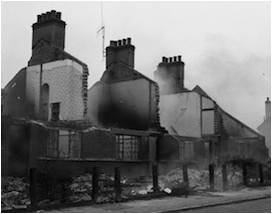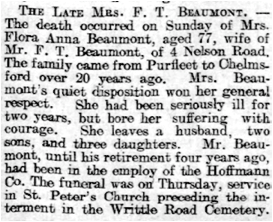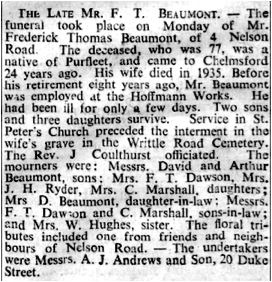Reuben Thomas William Beaumont came from Purfleet, his parents moved to Chelmsford in 1914 to live at Nelson Road. He joined the army and was killed at the Battle of Krithia Vineyard in Gallipoli in August 1915.
Reuben was born at Purfleet in 1889, the son of Frederick Thomas Beaumont and Flora Anna Beaumont (nee Poulton). His father had been born in Purfleet in 1860. His mother had been born in Bermondsey, Surrey in 1857. The couple, who were cousins, had married at St. Leonard’s Church in Shoreditch, London on 9th July 1882.
Reuben was one of eight children, two of whom were to die by 1911. They included: Mabel Eveline Beaumont (1883-1952), Laura Grace Beaumont (1884-1969), Lily Beatrice I. P. Beaumont (1886-1892), David Albert Beaumont (1891-1971), Arthur James Beaumont (1893-1970) and Flora Queenie Beaumont (1897-1986). All his siblings were Purfleet-born.
The family was recorded by the 1901 census at 13 High Street, West Thurrock. Reuben's father was a carman. The next census a decade later found the family at Hollow Cottages in Harlow. Reuben was then 11 and his father was a general labourer in a timber works.
In 1911 the census found 21 year-old Reuben living with his parents, five siblings and a nephew at The Stables in Purfleet. He, his father, and brothers David and Arthur worked in the chalk quarries - his father was a horse keeper, Reuben was a chalk tipper, David a motor driver, and Arthur a link maker. His sister Mabel was a hospital nurse.
In 1914 Reuben’s parents moved to Chelmsford and his father later worked at the town’s Hoffmann’s ball and roller bearings works.
Reuben subsequently lived in Rainham and enlisted into the army at East Ham, afterwards serving as Private 15986 in the 1st Battalion of the Essex Regiment. The battalion was part of the 88th Brigade in the 29th Division and had been in Mauritius at the outbreak of the war. It returned to England in December 1914, invaded Gallipoli, Turkey on 25th April 1915 and was involved in fierce fighting over the next few weeks: between 4th June and 9th June 1915 alone the battalion lost a total of 15 officers and 200 men, and afterwards only four officers of the original 25 who had left England on 21st March 1915 were still with the battalion.
Reuben had not participated in that initial landing in Gallipoli - instead he arrived there on 10th June 1915 as a reinforcement, one of a draft of five officers and 236 other ranks. At that time the battalion was in reserve at Gully Beach, before moving into the front line near Krithia on 13th June 1915. After a further stint at rest at Gully Beach the battalion returned to the trenches on 24th June 1915, moved to Fir Tree Wood three days later, and on 28th June 1915 participated in a successful advance of up to three-quarters of a mile into enemy territory.
July 1915 was a quiet time for Reuben’s battalion, including a period of rest on the Greek island of Lemnos from the 11th. On 28th July 1915 the battalion returned to Gallipoli, initially in reserve at Gully Beach, before going into the line near Krithia, where on 6th August 1915, it launched an attack on Turkish postions. The attack was intended to be a minor action to divert attention from an imminent Allied landing to the north at Suvla Bay. A post war account on what was later known as the Battle of Krithia Vineyard reported:
“The Essex were detailed to attack the trenches H12a, H12 and trenches under construction north-east of H12 near Krithia. The artillery opened at 2.30 p.m., but was replied to by the Turks with shrapnel and high explosives on the British trench system, particularly the reserve trenches, causing many casualties, At 3.50 p.m. the Battalion advanced on two lines, two companies (Y and Z) moving in H12a from the south-west, having 200 yards to traverse before reaching the enemy’s trenches. A third (W) attacked H12 and the connection with H12a, each company finding its own supports, X Company was in reserve. The movement on H12 was at first very successful. The position was taken with few casualties, but very heavy shrapnel fire was opened as the men moved forward again. With great gallantry they took the next trench (H12a), but were then held up by machine gun and rifle fire and bombs. The companies were so weak that on the Turks counter-attacking with bomb and bayonet they were driven back to H12a and its approaches, and then left to the corner of the Southern Barricade. The company on the left (W) reached the trench in continuation of the Southern Barricade and that leading north from it, but were unable to secure the continuation of the Northern Barricade. In the section between the two Barricades, serious casualties were sustained, six officers alone being killed there.
BEAUMONT, REUBEN THOMAS WILLIAM,
Private, 1st Battalion, Essex Regiment
At nightfall the Battalion had secured, as a result of much desperate fighting, the corner formed by H12 and the trench connecting that point and H12a, the only means of communication with which was a small tunnel under the Southern Barricade. Part of X Company was sent forward, with details of other companies, during the night, as the position was difficult to hold on account of its being exposed on three sides to enemy fire. The order had, however, been issued that the trench was to be held at all costs, and the men did so, although suffering considerably from thirst, supplies reaching them by means of petrol tins. At daybreak on August 7th the Battalion was moved out of the line to Gully Beach, having suffered very heavy casualties - killed, 50; wounded, 202; missing, 180; a total of 432.”
Among the dead that day, 6th August 1915, was Reuben, killed in action. Aged 26, he was one of 142 officers and men from the battalion who were later confirmed to have died that day, and one of three commemorated at Chelmsford. The others were William Green and George Warricker.
Reuben’s remains were able to be recovered for burial. However, after the war his grave could not be positively identified by the Imperial (later Commonwealth) War Grave Commission, so he is today commemorated on a special memorial in Twelve Tree Copse Cemetery, Helles. He was entitled to the 1914-15 Star, British War Medal, and Victory Medal.

Reuben is commemorated on the Civic Centre Memorial, Chelmsford and by the Chelmsford Parish Great War Memorial in Chelmsford Cathedral.
The 1918 register of electors showed Reuben’s parents at 4 Nelson Road, Chelmsford – a street parallel and to the west of Rainsford Lane, which contained 34 terrace houses, and has now been redeveloped as Cramphorn Walk. It is pictured in the course of demolition.
Reuben’s mother died in 1935, aged 77; his father died in 1938, aged 77.
130802

